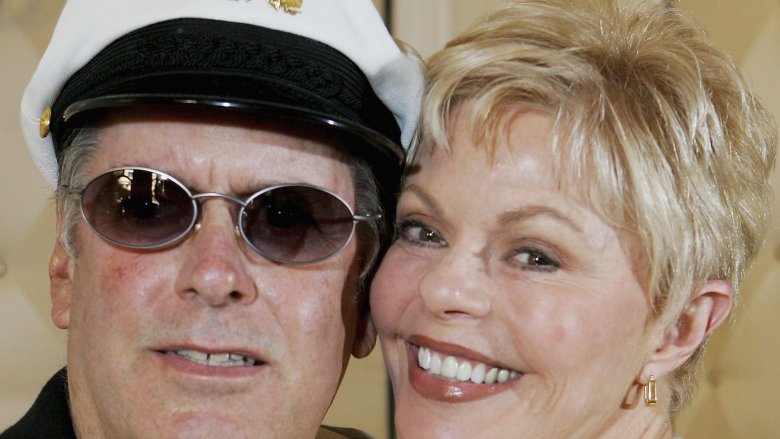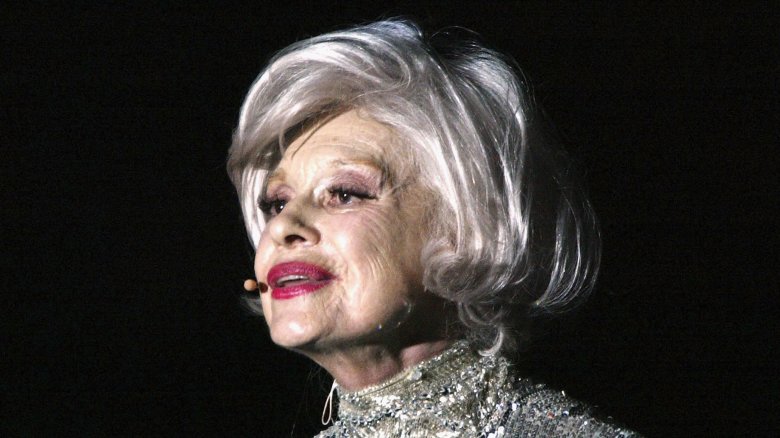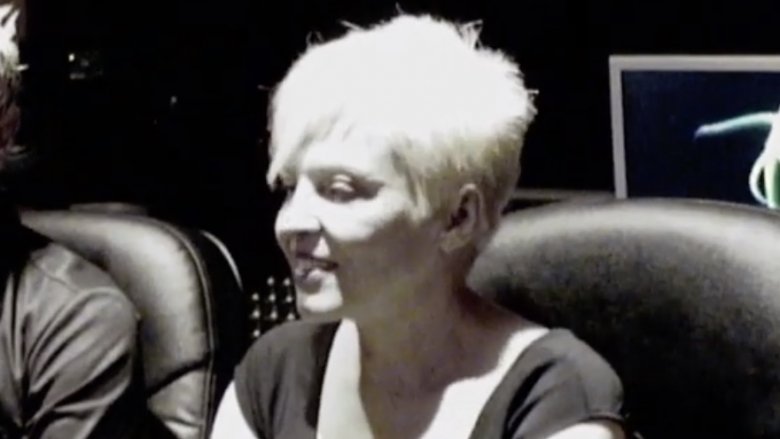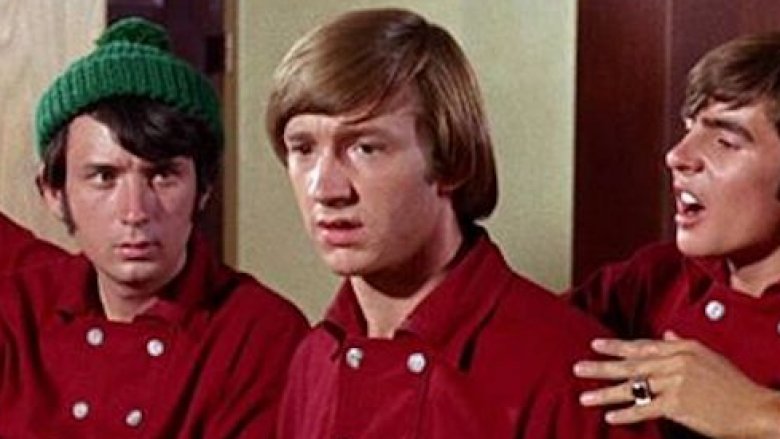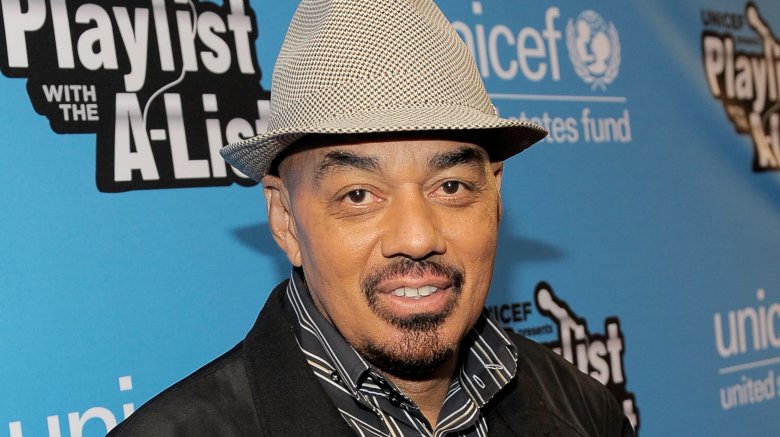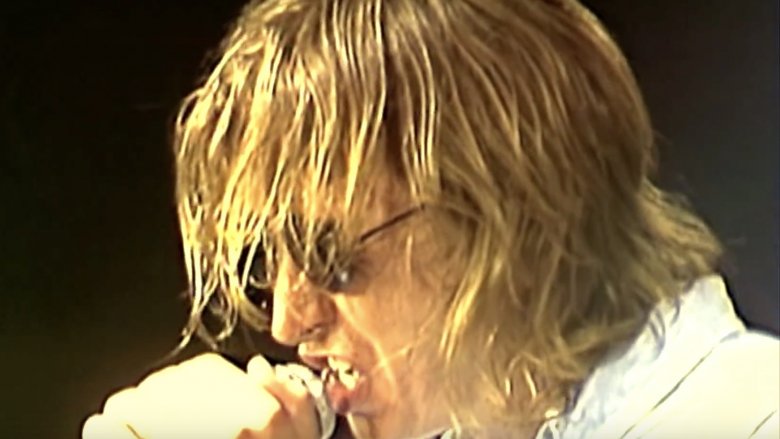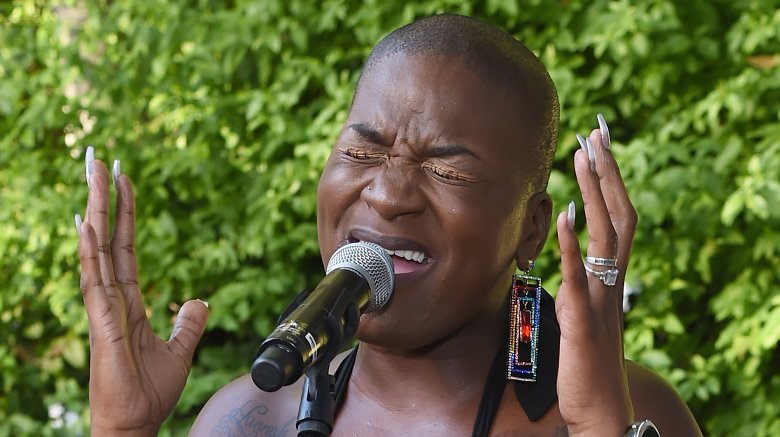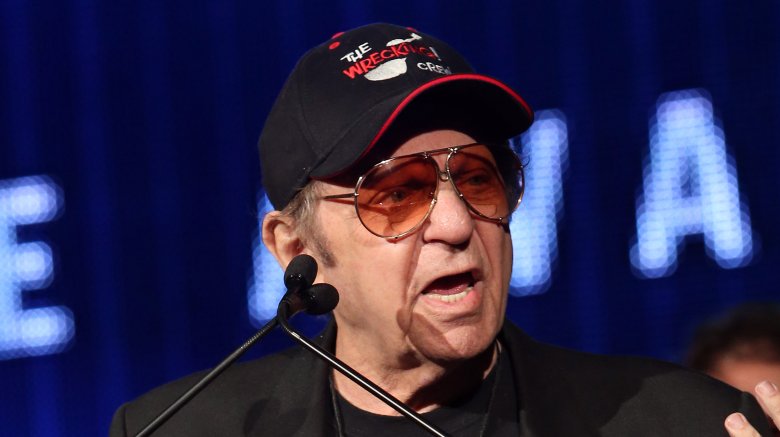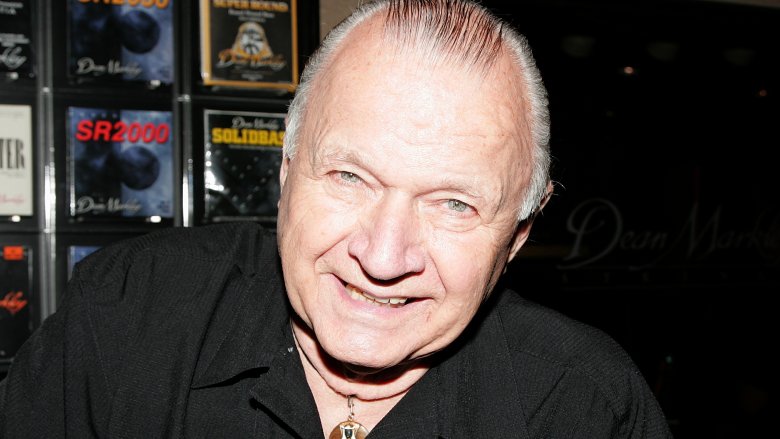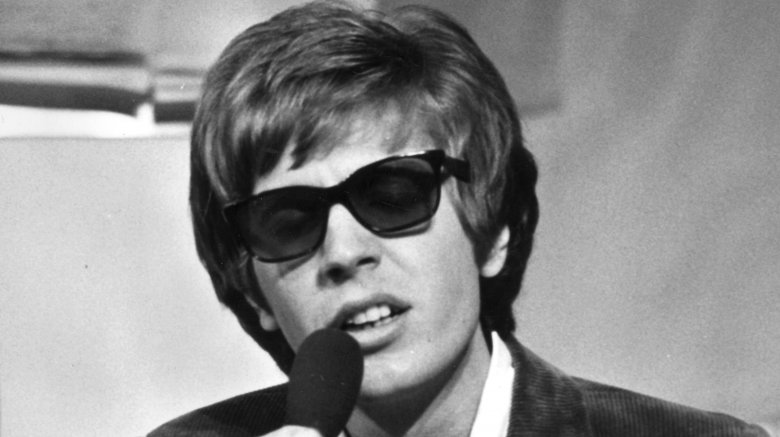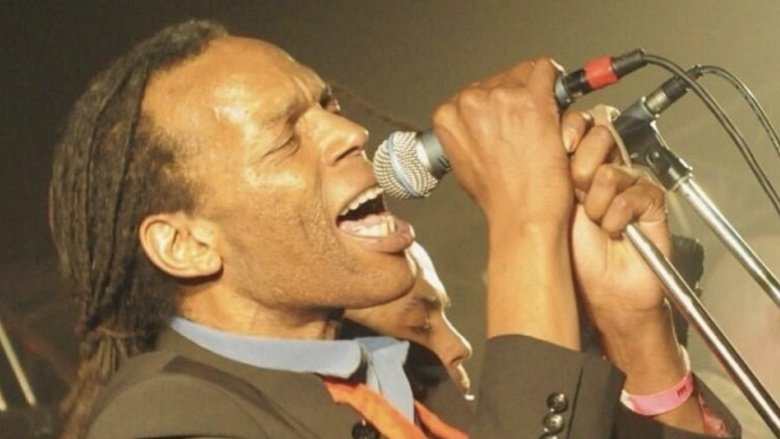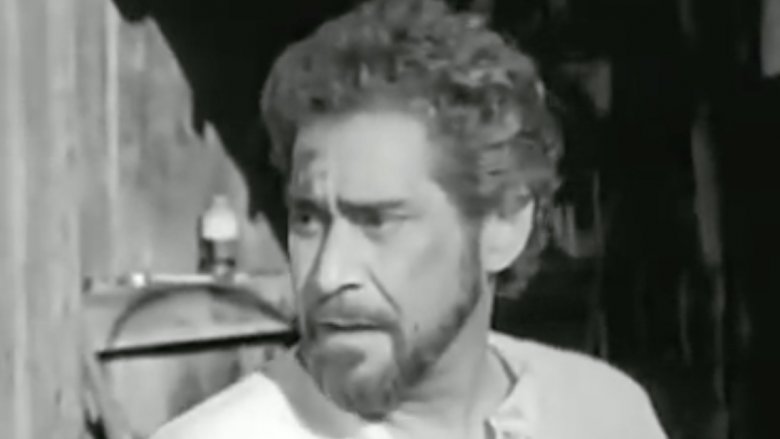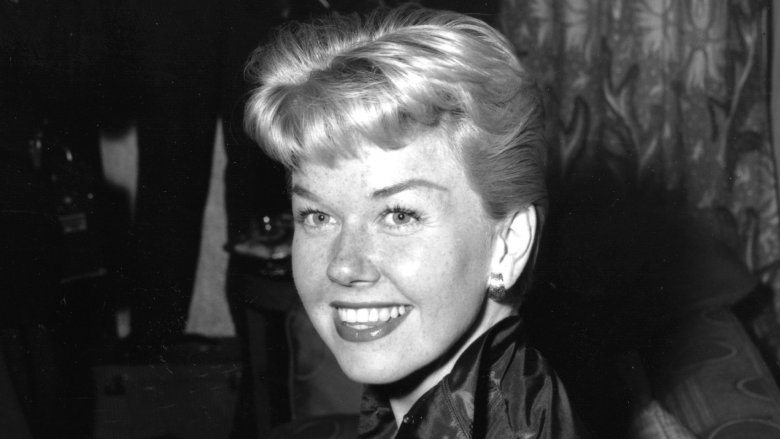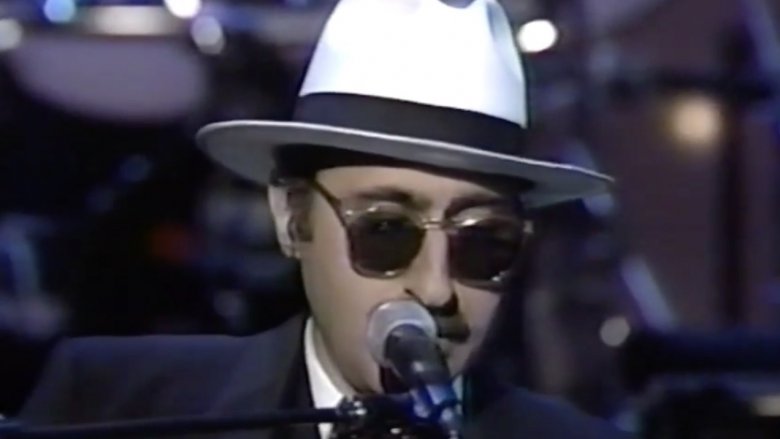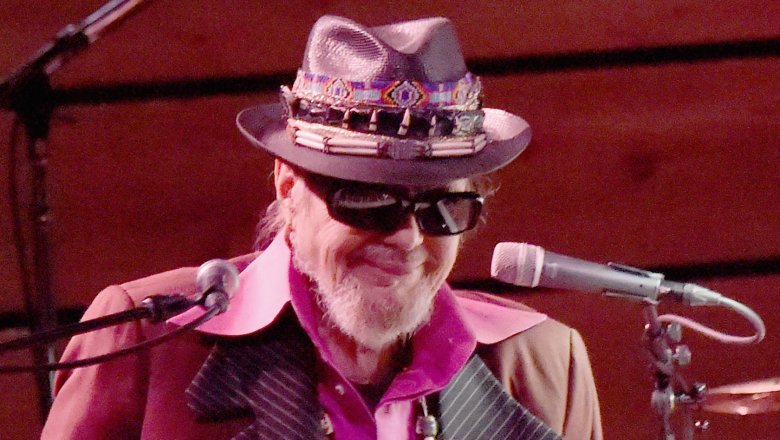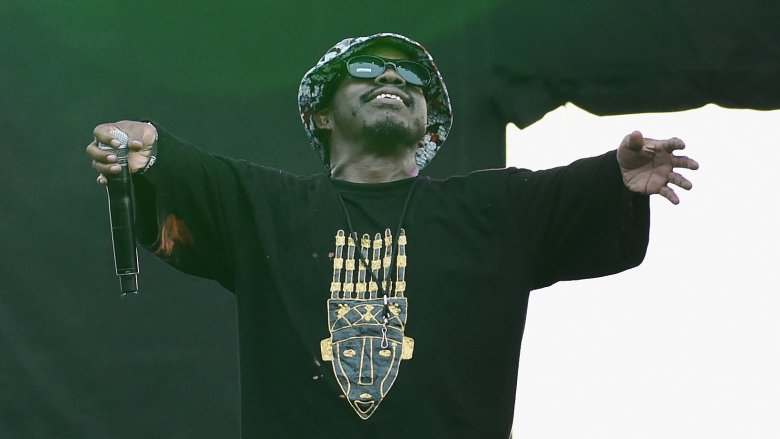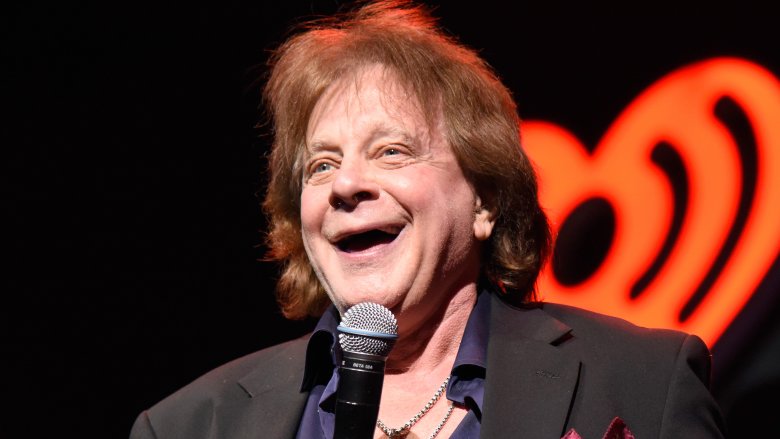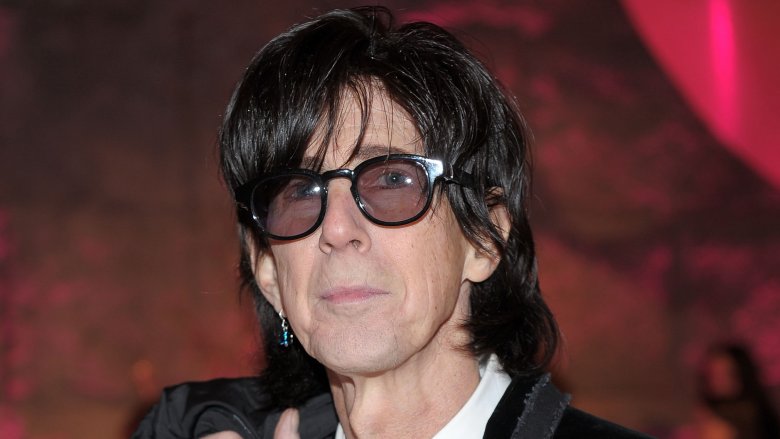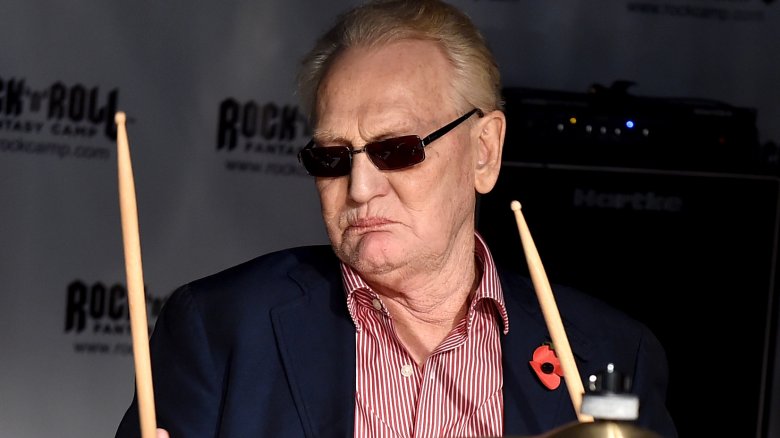Musicians We Lost In 2019 So Far
Celebrities just aren't like other people. Sure, on the whole they're more talented, better looking, and far wealthier than the average Joe Minivan or Judy Paycheck, but it's more of a perception thing. We feel like we know famous people — particularly the artists — because their work speaks to universally relatable themes, or rocks us, or moves us in some way. This is particularly true of musicians, who pour out their souls in their lyrics and craft a relatively small handful of notes into classic tunes that soundtrack important moments in our lives. Also, because their voices are permanently etched in wax, digital encoding, and whatever a CD is, it feels like they never die because their work never does. And really, isn't leaving a beloved legacy what all humans ultimately want to do with their time on this space rock?
Here are some of the most famous, notable, and influential musicians of all genres who in 2019 made a permanent break with mortality but whose work never will.
He was the Captain of the '70s
Punk rock and disco may be the most fondly remembered musical genres of the late '70s in retrospect, but during the Ford and Carter years, the soundtrack of America was provided by the bouncy, unabashedly cheesy love songs of the Captain & Tennille.
The duo behind the joyful "Love Will Keep Us Together," the bedroom jam "Do That to Me One More Time" and bonkers allegory "Muskrat Love" sang about what they knew. Pianist and keyboardist Daryl Dragon — nicknamed the "Captain" for his penchant of wearing a seafaring hat while performing — and singer Toni Tennille met in 1971, soon became romantically involved, and married in 1975, right around the time they started gently storming the pop chart. Those groovy sounds came from a guy with a solid musical pedigree: Dragon was a classical trained music student, and he got his first break backing up the Beach Boys during that group's 1960s heyday.
The Captain & Tennille's musical reign came to an end in the early 1980s, while the couple divorced in 2014. On January 2, 2019, Captain Dragon died of renal failure in an Arizona hospice at the age of 76.
Hello Dolly, Goodbye Carol
It's evolved into a niche medium whose events and individuals are known by an increasingly rarified group of grown-up theater kids and musical aficionados centered primarily in the New York area, but in the middle of the 20th century, Broadway was as broad, mainstream, and familiar to the average American as top 40 hits and box-office blockbusters. In the 1950s and '60s, cast albums from productions of My Fair Lady, West Side Story, and Hello, Dolly! were among the best-selling records of the era. That last one was thanks to the star power of one of biggest — if not the biggest — Broadway legend of them all: Carol Channing, who portrayed plucky matchmaker Dolly Gallagher Levi. Her stage presence, charisma, and idiosyncratic, rough-edged, talky style of singing paired well with musical theater, and Channing was never away from the Great White Way or Hello, Dolly! for long, starring in productions from the 1940s through the 1990s, including two revivals of her signature show. (She also sang her way through shows like Wonderful Town and Gentlemen Prefer Blondes, in addition to the occasional movie (a Golden Globe-nominated performance in Thoroughly Modern Millie), and cartoon voiceover work (Chip 'n' Dale Rescue Rangers and an animated The Addams Family adaptation). Channing was 97.
Lorna Doom was a good kind of Germ
In 1976, Los Angeles teenagers Teresa Ryan and future Go-Go Belinda Carlisle answered a newspaper ad looking for "two untalented girls" to join a punk band. Ryan and Carlisle got the gig and were soon playing the bass and drums, respectively in the influential L.A. punk band the Germs. Singer Darby Crash christened them with stage names of their own: Carlisle became Dottie Danger and Teresa Ryan was henceforth Lorna Doom.
While Crash jumped around the stage, cutting himself up with glass bottles, starting fires, and inciting riots, Lorna Doom provided a stabilizing presence, both with her stoic stage demeanor and solid, thick bass lines. The Germs played its first show in 1977, and soon after released its first (and only) single, "Forming," which the New York Times says just might be "the first Los Angeles punk record." In 1979, the band released its one and only studio album (GI), and split up in 1980 after Crash's death from a heroin overdose. After the Germs, Ryan largely left music and worked in art galleries. On January 16, 2019, the punk icon died at age 61 in Thousand Oaks, California, according to Germs drummer Don Bolles.
The country lost a country legend
Harold Bradley was so old school country music that he played a major part in establishing his hometown of Nashville as the capital of the genre, if not a world-renowned music city. Growing up in the area's rich musical culture, Bradley first learned to play the banjo, which probably made learning to play the guitar seem like a piece of cake when his older brother, Owen, convinced him to switch instruments. In 1954 the siblings opened the Bradley Film and Recording Studios, later renamed the Quonset Hut Studio. That marked the first (of many) studios on Nashville's legendary "Music Row."
Not just the boss, Bradley was also a resident session musician at the Quonset Hut, an essential member of The A-Team, a group of studio players that backed superstars like Elvis Presley, Loretta Lynn, Johnny Cash, and Dolly Parton. It's the lyrical guitar of Bradley that almost steals classic tunes like Roger Miller's "King of the Road" and Brenda Lee's "I'm Sorry."
Also the first president of the Nashville wing of the National Academy of Recording Arts and Sciences — validation of country music by the rest of the industry — Bradley died at the age of 93 on January 31, 2019, "peacefully in his sleep" according to his daughters.
Hey, hey, we lost a Monkee
When TV producers Bob Rafelson and Bert Schneider were putting together a Beatles-esque band of American guys to star in a sitcom and form a band, they offered folk singer Stephen Stills a spot. He turned it down but recommended someone far more suited to the gig: his Greenwich Village folk scene buddy Peter Thorkelson. Turns out the soon-to-be-renamed Peter Tork had a natural gift for comedy suited to the zany, go-go antics of The Monkees, and he was also a talented and versatile musician who could play guitar, bass, banjo, and keyboards. (And he could sing to boot.)
During the Monkees' peak period between 1966 and 1969, Tork was a superstar and teen idol. While the tightly controlled band wasn't always allowed to play on Monkees songs, they were allowed to sing and, later, write a little. Tork contributed some of the band's most forward-leaning songs, including "Do I Have to Do This All Over Again," "Zilch," and "Words." Tork fully embraced the Monkee/man dichotomy over the decades, happily joining up for the band's monstrously successful reunion in 1986.
Tork, who had been diagnosed with a rare form of cancer in 2009, passed away on February 21, 2019, at age 77.
Yah mo be in mourning for James Ingram
After getting his start in the '70s funk band Revelation Funk (which landed a track, "Time Is On Our Side" on the soundtrack of the 1975 cult classic Dolemite), James Ingram found his niche in the music industry: as a sideman, collaborator, and duet partner. He played keyboard for Ray Charles before becoming super-producer Quincy Jones' second weapon in the 1980s. He sang on two hit singles of Jones' star-studded 1981 album The Dude — "Just Once" and "One Hundred Ways." That auspicious debut earned Ingram three Grammy nominations — Best New Artist, Best Male Pop Vocal Performance ("Just Once"), and a win for Best Male R&B Vocal Performance ("One Hundred Ways"). Ingram kept dueting and kept scoring hits and awards — his collaboration with Michael McDonald, "Yah Mo B There" won a Grammy, while he sang with Linda Ronstadt on "Somewhere Out There," the hit ballad from An American Tail, and with Patti Austin on both the Oscar-nominated song "How Do You Keep the Music Playing" from Best Friends and the #1 hit "Baby, Come to Me." In the early '90s, his smooth, silky, expressive voice was all over soft-rock radio: His breakout solo hit "I Don't Have the Heart" topped the charts in 1990. Ingram was 66.
Mark Hollis was the Talk Talk of the New Wave scene
The New Wave and synth-pop movements of the late '70s and early '80s put the keyboards and machinery first and foremost, and the quality of a lead vocalist's singing abilities were just not as important. But not for Talk Talk. Lead singer Mark Hollis didn't have the quirky, robotic, disconnected voice of peers like Ric Ocasek of the Cars or Gary Numan — he had a rich, throaty, shockingly soulful tone on par with contemporaries like Bryan Ferry or David Bowie. Hollis' pipes elevated Talk Talk's already hook-laden, earwormy, synth-driven songs into classics of the genre and of the era that still get played on '80s nights and "retro" hours everywhere.
Talk Talk (which also included drummer Lee Harris and bassist Paul Webb) scored just one top 40 hit in the U.S.: the empowering, anthemic "It's My Life" in 1984, but the group was a continuous presence on the British pop chart throughout the '80s and early '90s, the biggest successes coming with "Today," "Life's What You Make It," "Living in Another World," and "Talk Talk." (Yes, Talk Talk had a song called "Talk Talk.") On February 24, 2019, reports of Hollis' death began popping up, and two days later Hollis' manager Keith Aspden confirmed that the singer had passed away at age 64.
Keith Flint was an electronic music Prodigy
In the late '90s, music filed under the umbrella term of "electronica" was the next big thing in pop culture. The most photogenic and interesting electronic-music personalities became the rock stars of the moment and presumably of the future. Two of the biggest breakout acts of this Wild West, post-grunge period: the helmet-wearing French robots of Daft Punk, and Keith Flint, front man of the English act the Prodigy. Sporting an often garishly-dyed mohawk plus intimidating, punk-inspired street fashions and wild eyes surrounded in thick black paint, Flint became the de facto public face of his band and his genre, bopping around the stage and delivering menacing vocal hooks on smash hits like "Firestarter" and "Breathe." Both singles originated from the Prodigy's The Fat of the Land, which debuted at #1 on the Billboard album chart in July 1997.
On Monday, March 4, Prodigy founder Liam Howlett announced Flint's death via a statement on the group's Facebook page. "It is with deepest shock and sadness that we can confirm the death of our brother and best friend Keith Flint. A true pioneer, innovator, and legend. He will be forever missed." According to Howlett via the Prodigy's Instagram account, the 49-year-old front man "took his own life" sometime over the previous weekend.
If you or anyone you know is having suicidal thoughts, please call the National Suicide Prevention Lifeline at 1-800-273-TALK (8255).
Janice Freeman had the Voice
The Voice did for Compton's Janice Freeman exactly what it purports to do: provide national exposure and a weekly performance platform for amazingly talented singers that were either up-and-comers or who had never quite found their big break. In 2017, Freeman competed on NBC's top-rated talent show, wowing judges in the "blind" audition phase with a soulful, crushing rendition of Imagine Dragons' "Radioactive." Two judges, Miley Cyrus and Jennifer Hudson, wanted Freeman on their team, and she ultimately chose the former.
Freeman lasted through several episodes of the competition, showing both range and a talent for interpretation, making songs as varied as Collective Soul's "Shine" and Brandi Carlile's "The Story" all her own. The singer made it into the top 11 before her elimination after a performance of Sia's "Chandelier."
On Saturday, March 2, 2019, Freeman died after being transported to a hospital via ambulance. She'd contracted a severe case of pneumonia, and a blood clot traveled to her heart. The singer was 33 years old.
Hal Blaine probably played drums on your favorite song
After a move from Massachusetts to California in 1943, aspiring drummer Harold Belsky trained with Roy Knapp, the same guy who taught legendary jazz drummer Gene Krupa. Before long, the student surpassed the teacher. Harold Belsky became Hal Blaine, and after cutting his teeth playing in big bands, Hal Blaine became one of the greatest and most celebrated drummers of all time, as the top session musicians in the business. Not only in quantity — Spin says Blaine estimates he played on more than 35,000 recordings — but quality, too. Among the songs that bear Blaine's distinctive beat-keeping: Simon & Garfunkel's "Mrs. Robinson," the Beach Boys' "Good Vibrations," the Ronettes' "Be My Baby," Frank Sinatra's "Strangers in the Night," the 5th Dimension's "Aquarius / Let the Sunshine In," the theme song from The Brady Bunch, and various recordings by Steely Dan, Herb Alpert, and the Monkees.
Blaine sat behind that kit until the end — he played drums with a band at his own 90th birthday party in February 2019. On March 11, 2019, Blaine's family confirmed on the drummer's Facebook page that the musician had passed away at age 90. In mourning his friend and colleague, no less an authority than Brian Wilson of the Beach Boys called Blaine "the greatest drummer ever."
Dick Dale was the king of the surf guitar
In 1954, 17-year-old Richard Monsour moved to California, took up surfing and rock guitar. Nicknamed "king of the surf guitar" by fans — NPR says his single "Let's Go Trippin'" is arguably the first of the distinctly American genre of surf rock — Dale told NPR in 2010 that he aimed to replicate the sounds and feelings of surfing in music. "When the waves picked me up and took me through the tubes, I would get that rumble sound."
He'd started out as a drummer, and he applied the staccato drumming of big band star Gene Krupa when he switched to guitar, as evidenced on his signature tune "Miserlou," a wild and impossibly fast version of a Middle Eastern folk song he'd heard his Lebanese uncles play on a stringed instrument called the oud. "I started playing it," he told NPR in 2010, "And I said, 'Oh no, that's too slow.'" Under the stage name Dick Dale, and with "Miserlou" in his arsenal, he brought instrumental surf rock to the fore. Dale experienced a major comeback in 1994, when Quentin Tarantino used "Miserlou" as the opening music to Pulp Fiction, a perfect fit for the retro crime saga.
No cause of death was immediately revealed, but in recent years Dale had fought a number of health issues, including kidney disease and rectal cancer. He died on March 16, 2019, at age 81.
Scott Walker was David Bowie's David Bowie
What if Justin Bieber suddenly decided to make moody, experimental stuff befitting Animal Collective? That's pretty much what happened when Scott Walker left the Walker Brothers and became one of his generation's most innovative singer-songwriters. The Beatles-esque Walker Brothers did very well for themselves in the '60s with hits like "Make It Easy On Yourself" and "The Sun Ain't Gonna Shine Anymore." But Walker wanted to do more, so, he went solo — and took on a dark, baroque, and imaginative approach, releasing Scott, Scott 2, Scott 3, and Scott 4 all between 1967 and 1970. Among his tunes: "The Seventh Seal" (a song about the plague) and the nationalism-criticism "Hero of the War." Not exactly Backstreet Boys material, but Walker remained prolific into the '70s, '80s, and beyond. Since 2010, he released the albums Bish Bosch, the Sunn O))) joint project Soused, and the score for the film Vox Lux.
His work was so future-forward that he inspired two of the most future-forward musicians in his wake. Thom Yorke called Walker "a huge influence on Radiohead and myself, showing me how I could use my voice and words." David Bowie once described Walker as "my idol since I was a kid."
The musician, whose real name was Noel Scott Engel, died on March 22, 2019, according to 4AD, the innovative record label where he made music until the end. Walker was 76.
Nipsey Hussle hustled ever so briefly
The father of Ermias Asghedom fled the war and bloodshed in his home country of Eritrea and settled in the U.S., where he had a son (Ermias) who grew up to become rapper Nipsey Hussle. (The name is a play on that of mid-century entertainer and frequent game show panelist Nipsey Russell.) His music resonated with fans, a new version of the gangsta rap of the '90s, as Nipsey Hussle mined similar content: the violent, gang-controlled streets of Los Angeles. He flowed of which he knew, as he was once a member of the notorious Rolling Sixty Crips, and he chronicled, explored, lamented, and made art of those experiences on one studio album (Victory Lap, a Grammy nominee for Best Rap Album), dozens of singles, and a slew of now-legendary mixtapes, such as The Marathon.
Hussle was just as devoted to ending the systemic violence of Los Angeles as he was to making music about it. He owned a strip mall in the tough Crenshaw Boulevard area of Los Angeles, right where he used to hang out as a kid. The rapper and his business partner had big plans to redevelop the area into condos and stores, energizing and providing new resources to turn the neighborhood around. That mall housed Hussle's clothing store, Marathon, and right in front of it is where the violence he aimed to end took his life. While standing outside on March 31, 2019, he was gunned down in a drive-by shooting. The rapper and advocate was 33.
Ranking Roger kept the Beat
The Beat (or, as they're known in the U.S., the English Beat), came up as part of the second wave ska movement in the U.K. in the late '70s and early '80s. They experienced big commercial success, and their songs endured because they were more than just a genre band. The Beat combined ska elements (like a horn section) with soul, reggae, punk, and pop hooks to make some of the era's most indelible standards, particularly "Save it for Later" and "Mirror in the Bathroom." Leading the band's musical direction with a soulful, emotive voice was singer Roger Charlery, or, as he was known on stage, Ranking Roger.
After the Beat split up in 1983, he and bandmate Dave Wakeling formed a new band called General Public. It sounded very similar to their old band, thanks to Ranking Roger singing his heart out on hits like "Tenderness" and a cover of the Staples Singers' "I'll Take You There." In early 2019, Ranking Roger announced that he had been diagnosed with lung cancer and had also suffered a stroke. He died on March 26 at the age of 56.
One accident killed both members of U.K. indie duo Her's
Stephen Fitzpatrick of northern England and Audun Laading of Norway met while attending the Liverpool Institute for the Performing Arts in the U.K. They became fast friends and formed a duo they called Her's. The band released its first album, Invitation to Her's, in August 2018, and it earned critical praise. The Guardian favorably compared the group to acts as good and disparate as the Smiths, Aztec Camera, and Everything But the Girl. Fitzpatrick and Laading were clearly, as the Guardian said, "ones to watch," but they were cut down during their promising rise.
Only a few times in music history (thankfully) has a tragedy wiped out most or all of a band — such as the plane crashes that killed Lynyrd Skynyrd and the Bar Kays. Sadly, the British indie rock duo Her's joined this awful club on March 27, 2019. While on an American tour promoting Invitation to Her's, the band was traveling by van with their tour manager, Trevor Engelbrekston, from Phoenix to California when they were involved in a fatal head-on collision.
Earl Thomas Conley was the king of '80s country
At the dawn of the 1980s, the lines between country music and pop blurred, and the twangy genre went mainstream — without losing its authenticity — thanks to performers like George Strait, Kenny Rogers, and Earl Thomas Conley. Conley was a musical late bloomer, signing with small Nashville record label GRT in 1974 after six years of trying to break through following a stint in the U.S. Army in the late '60s. While his early songs didn't go anywhere, he found work writing hits for big artists, such as "This Time I've Hurt Her More Than She Loves Me" for Conway Twitty. In 1979, Warner Bros. Records snatched up Conley, and he soon began a successful run of country chart hits — Conley went to #1 a remarkable 18 times in the 1980s. Among his best known songs: "Fire and Smoke," "Your Love's on the Line," and "Don't Make It Easy for Me."
Conley's brother confirmed the 77-year-old singer died in the early hours of April 10, 2019, following a long illness and hospice care. Country star Blake Shelton reflected on Conley's death on Instagram. "Earl was my all time favorite singer, hero and my friend."
Que Sera Sera for Doris Day
Doris von Kappelhoff became one of the most famous, popular, and iconic entertainers of all time, gliding through careers as a singer and actress under the stage name of Doris Day. Her career goes back to the age of the big band. In the 1940s, she fronted Les Brown's band, and her sunny voice fueled some of the pre-rock era's biggest hits, including "Sentimental Journey," "Day by Day," and "Till the End of Time." After striking out on her own, she did just as well, with smashes like "A Guy is a Guy" and "Secret Love."
Day was also a movie star in the 1950s and '60s, maintaining a "girl next door" quality in romantic comedies including That Touch of Mink, Teacher's Pet, and, with her frequent costar Rock Hudson, Pillow Talk and Lover Come Back. But she could also handle Hitchcock — Day starred in The Man Who Knew Too Much and sang its crucial song, "Que Sera Sera," which would go on to win the Oscar for Best Original Song and become her signature piece.
In the '70s, Day largely retired, only making occasional appearances in favor of running an animal rescue charity called the Doris Day Animal Foundation. Day, 97, died at home in Carmel, California, on May 13, 2019, after a bout with pneumonia.
Leon Redbone made old timey music cool and fresh
Never appearing in public without his hat, sunglasses, and mustache, Leon Redbone was a singer and guitarist who kept the details of his off-stage life so shrouded in mystery that he very well could have been concealing the fact that he was a time-traveler. That's how expertly and lovingly he performed early American-style music — folk, pop, vaudeville, and Tin Pan Alley — in his suitably old-time drawl. According to the Toronto Star, Redbone was born Dickran Gobalian in Cyprus, then moved to Canada in the mid-1960s, changed his name, and started playing folk clubs, where his aim to play old-fashioned music fit in nicely.
He kept at it, and in the mid-1970s he became an unlikely and critically hailed pop sensation. High-profile fans like Bob Dylan and Bonnie Raitt thought he was the bee's knees, and he was a fixture during the early seasons of Saturday Night Live. Redbone's voice was even more distinctive than his style, and it reached far beyond the 16 albums he recorded in his career — he sang the theme song to '80s sitcom Mr. Belvedere, showed up in commercials for Purina dog food and Budweiser, and voiced the stop-motion snowman Leon in the Christmas classic Elf. Redbone retired from performing in 2015 due to health issues, and he died at age 69 on May 30, 2019. Forever a witty guy, his probably self-written death announcement listed his age of death as 127.
Dr. John brought New Orleans to the rest of the world
Malcolm John Rebennack kept New Orleans' distinctive musical flavor alive and evolving with a career that lasted more than 50 years. He's better known by the stage name Dr. John, a quintessential New Orleans personality he originally developed for a high school friend and bandmate. However, the friend abandoned the persona after he got a record deal, leaving Rebennack to take up the Dr. John mantle. He first hit the lively Big Easy music scene in the late '50s as a guitarist at the Dew Drop Inn, a local landmark and African-American nightclub (during the segregation era), and did session work for local musicians.
According to Dr. John, he switched to his signature instrument, the piano, when he got in a fight after a dance and was shot in the finger, leaving him unable to play the guitar as well as he was used to. It was from behind the keyboard that Dr. John blossomed, sometimes billing himself under the sub-persona the Night Tripper, embracing and adding to New Orleans lore and celebrating the city's colorful residents, everyone from priestesses to criminals. In the '70s, he added pop, rock, and psychedelic influences to that New Orleans jazz and mysticism to create his own original sound. His biggest hit was the 1973 classic rock staple "Right Place, Wrong Time." Dr. John died on Thursday, June 6, 2019, of a heart attack. He was 77.
Bushwick Bill helped create Houston hip-hop
As a member of the Geto Boys, Bushwick Bill brought new character to hip-hop. Sure, he rapped about life in the tough neighborhood of Houston's Fifth Ward, but he delivered his thoughts with an extreme level of bizarre and violent imagery, the kind of stuff more common in a horror movie than a rap song. Born in Jamaica and small in stature due to a type of dwarfism, the man born Richard Stephen Shaw settled with his family in the Bushwick area of Brooklyn before moving to Houston. After joined the Geto Boys as a dancer named Little Billy, he soon earned a promotion to rapper, where, alongside Willie D and Scarface, he introduced the world to the proto-Southern rap sound, quite different than the stuff coming out of hip-hop hotbeds like Los Angeles and New York. The Geto Boys' 1991 album We Can't Be Stopped includes the group's best known song, "Mind Playing Tricks on Me," as well as one of the most shocking album covers ever printed. It is a real photo of Bushwick Bill, who, after a substance-fueled fight with his girlfriend, was shot in the eye. The picture shows him bloodied on a stretcher flanked by the other Geto Boys.
Bushwick Bill had long battled pancreatic cancer, prompting a Geto Boys reunion/farewell tour, but it was canceled due to the rapper's declining health. On June 9, 2019, Bushwick Bill passed away in Colorado at the age of 52.
We can't hold on to Eddie Money
Amid the glitzy, larger-than-life figures of '70s and '80s arena rock, Eddie Money was a refreshing alternative, a regular, blue-collar, avuncular sort of guy who sang simple, straightforward, relatable rock songs about love and romance with his deep, throaty voice. The man born Edward Mahoney could've been a regular, blue-collar guy himself, but after serving as New York City police officer for two years, he quit in 1968 to pursue a musical career in California under his stage name. Before long, he was cranking out the hard rock hits that would make him a radio staple. Among the most memorable of his more than 20 hits in the '70s, '80s, and early '90s: "Baby Hold On," "Walk on Water," "Think I'm in Love," "Take Me Home Tonight," and "Two Tickets to Paradise."
In August 2019, Money announced that he had been diagnosed with stage 4 esophageal cancer in late 2018, and he documented his struggle with the disease on his reality show, Real Money. A few weeks after that bombshell, Money passed away at the age of 70.
Daniel Johnston was the godfather of indie music
Daniel Johnston was an outsider to the mainstream music world, an idiosyncratic but prolific singer-songwriter who did things his own way, using his high, shaky voice to charm audiences with his deceptively simple songs like "True Love Will Find You in the End." His work would prove extremely influential — the bands that inspired all the other bands were themselves inspired by Johnston. Among his admirers and acts that covered his songs: Sonic Youth, the Flaming Lips, Yo La Tengo, Tom Waits, Beck, and Kurt Cobain.
In 1980, Johnston self-recorded his first album, Songs of Pain, then self-released it on cassette. After the seminal Hi, How Are You in 1983, Johnston moved to Austin, Texas, where he continued to make and hand out his own stuff. An intrigued MTV profiled him, which drew attention to both Johnston and the burgeoning Austin indie rock scene. Johnston created more than two dozen musical projects, with the last, Space Ducks, arriving in 2012. Struggling for years with his health — he had kidney problems and dealt with schizophrenia and bipolar disorder — he gave up touring after a 2017 swing backed by members of Wilco and Built to Spill. According to his manager, he died at home on September 11, 2019, after a heart attack. Johnston was 58.
The Cars' Ric Ocasek drove '80s rock
As its primary singer and songwriter, Ric Ocasek was the architect of the sound of his band and subsequently all of New Wave, a burgeoning musical genre that blended catchy pop hooks with a raw rock edge. Shortly after forming in 1976, the Cars ranked among the most popular and era-defining bands of the late '70s and 1980s, churning out one memorable hit after another, including "Just What I Needed," "My Best Friend's Girl," "Good Times Roll," and "Magic." The Cars were among the first groups to embrace the music video — their funny, special effects-enhanced 1984 clip for "You Might Think" won the first ever MTV Video Music Award for Video of the Year. (Ocasek benefited professionally as well as personally from MTV — he met his third wife, model Paulina Porizkova on the set of the "Drive" video.) The Cars split acrimoniously in 1988, and while Ocasek released some solo albums, he truly made his mark behind the console. Once again, Ocasek helped an era find its sound, producing records for major '90s alternative rock acts like Weezer, Bad Religion, Hole, and Guided by Voices.
In 2018, the Cars were inducted into the Rock and Roll Hall of Fame, not long before Ocasek and Porizkova announced their split after three decades together. On September 15, 2019, Ocasek was discovered dead in his New York apartment. He was 75.
Kim Shattuck made punk pop and pop punk
The 30-year-plus career of Kim Shattuck is also the history of the development of American alternative rock — and she played a big part in how that sound evolved. She got her start in the '80s with the Pandoras, an L.A. psychedelic garage rock band that got more of a hard edge as the decade wore on. In 1991, she left that group and with former bandmate Melanie Vammen, Shattuck soon formed the Muffs, a quintessential '90s alterna-pop band, blurring the lines between pop-rock and punk and anchoring it all with her signature raspy but bouncy vocals. The Muffs are probably best known for a cover of Kim Wilde's "Kids in America" for the soundtrack of Clueless, a song that pretty much defined that classic teen movie. Shattuck also guested on songs by bands clearly influenced by the Muffs' edgy/snarling/radio-friendly pop-punk, such as NOFX and Bowling for Soup. In 2013, she enjoyed a short but high-profile stint replacing Kim Deal in the Pixies, a gig that would last a mere five months.
On October 2, 2019, Shattuck succumbed to the effects of myotrophic lateral sclerosis (ALS), the degenerative nerve disease with which she'd suffered for two years. The singer-songwriter-instrumentalist was 56.
Ginger Baker redefined rock n' roll drumming
Rush's Neil Peart told Rolling Stone in 2009 that he — and every other drummer for that matter — looked up to Ginger Baker. "Every rock drummer since has been influenced in some way by Ginger — even if they don't know it." His incomparable style somehow combined jazz rhythms with pop precision, as well as early rock's blues flavor with a future-forward ear toward hard-charging heavy metal. After playing in a series of popular blues-rock bands in England in the early '60s, Baker found a musical soulmate in guitarist Eric Clapton. In 1966, they formed Cream (with bassist Jack Bruce) and churned out four classic albums by the end of the decade. Standout tracks like "Badge," "White Room," and "Sunshine of Your Love," still get major airplay on classic rock radio. One good supergroup deserves another, and after Cream split, Baker followed Clapton into Blind Faith, a collaboration with Steve Winwood. In the '70s and beyond, Baker became a highly sought after session drummer and sideman, playing on landmark recordings for everyone from Bela Kuti to Hawkwind to Public Image Ltd.
In recent years, Baker faced some health scares, including a struggle with osteoarthritis and heart problems that required open-heart surgery. In late September 2019, Baker's family announced that the legendary drummer was "critically ill in hospital." On October 6, he passed away at the age of 80.
Juice Wrld was gone too soon
Rapper Juice Wrld experienced a lot of music industry success, and quickly at that. In 2018, his debut album Goodbye & Good Riddance hit #4 on the Billboard album chart and spawned the huge hits "All Girls Are the Same" and "Lucid Dreams," which made it all the way to #2 on the Hot 100. (That song featured a sample of the guitar riff from Sting's "Shape of My Heart"; the guy who came up with that motif, guitarist Dominic Miller, said that "Lucid Dreams" constituted "the most intelligent version of that riff that I've ever heard." Other hits followed, including "Fine China," "Robbery," and "Bandit," and his second full-length album Death Race for Love went all the way to #1.
Just after the release of Goodbye & Good Riddance, Juice Wrld (real name: Jarad Anthony Higgins) dropped the EP Too Soon..., a tribute to deceased rappers Lil Peep and XXXTentacion. The song "Legends" includes the sadly prophetic line, "What's the 27 club? We ain't making it past 21."
On Sunday, December 8, 2019, Juice Wrld disembarked from a plane at Midway Airport in Chicago, and while walking through the terminal, suffered a seizure. According to law enforcement sources who spoke to TMZ, blood was coming out of the rapper's mouth when paramedics arrived. Conscious when transported by emergency officials but pronounced dead at a hospital within hours, Juice Wrld turned 21-years-old just a few days before his death.
Marie Fredriksson of Roxette rocked pop radio
While not usually mentioned in the same breath as acts like Madonna, Michael Jackson, and Prince, the numbers don't lie — Roxette was one of the most successful pop music entities of the late 1980s and early 1990s. The Swedish duo, comprised of guitarist Per Gessle and lead vocalist Marie Fredriksson, produced a slew of internationally popular upbeat tunes, like "Dangerous," "Dressed for Success," "The Look," and "Joyride." The latter two topped the Billboard Hot 100, as did a couple of emotional power ballads fueled by Fredriksson's powerful vocals: "Listen to Your Heart" and "It Must Have Been Love," a standout from the soundtrack of the 1990 mega-blockbuster Pretty Woman.
Fredriksson fought cancer for nearly two decades. First diagnosed with a brain tumor in 2002, she recovered after receiving extensive treatment and within a few years she was feeling healthy enough to perform and record more Roxette albums. In 2016, her doctors asked her to quit touring so as to focus on her health. Fredriksson succumbed to her health problems on December 9, 2019, at the age of 61.

